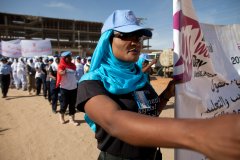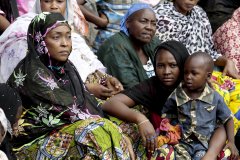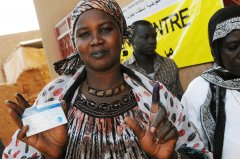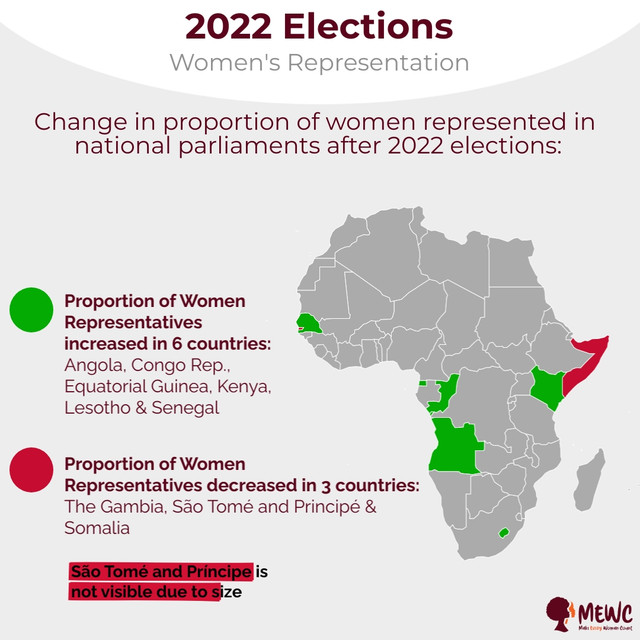Gender Issues Showlist
Women, Peace & Security
UNSCR 1325 calls on all parties to: protect and respect the rights of women and girls in conflict & post-conflict; increase women participation in all conflict resolution, peacekeeping and peace-building & to end impunity by prosecuting perpetrators of sexual and other violence on women and girls
index.php?option=com_content&view=category&id=56&Itemid=1913
Human Rights of Women
Thirty six years after the adoption of CEDAW, many women and girls still do not have equal opportunities to realize rights recognized by law. Women are denied the right to own property or inherit land. They face social exclusion, “honor killings”, FGM, trafficking, restricted mobility, early marriage,...
index.php?option=com_content&view=category&id=44&Itemid=1908
Violence Against Women
Violence against women is the most shameful human rights violation. Gender based violence not only violates human rights, but also hampers productivity, reduces human capital and undermines economic growth. It is estimated that up to 70 per cent of women experience violence in their lifetime
index.php?option=com_content&view=category&id=69&Itemid=1912
Political Participation & Leadership
Where women are fully represented, societies are more peaceful and stable. Women political participation is fundamental for gender equality and their representation in positions of leadership must be a priority for all Africans governments.
index.php?option=com_content&view=category&id=65&Itemid=1911
Latest News
- COTE D'IVOIRE: South-South Meeting to Promote Gender Equality and Combat Deforestation
- RWANDA: Rwanda Set to Launch Cervical Cancer Elimination Plan
- NIGERIA: Over 5,000 Nigerian Women Stranded in Iraq - Govt
- SUDAN: Healthcare Collapse Threatens Pregnant Women in Sudan's Sharg El Nil
- GHANA: President Nominates 12 More Ministers
- Senegal: Parliamentary election 2024
- Mauritius: Parliamentary election 2024
- Ghana: Presidential and Parliamentary Elections
- Botswana: Parliamentary elections 2024
- Algeria: Presidential Election 2024
NIGERIA: Flying Citizens From Libya Amid 'Endemic' Abuse
Source: Aljazeera
Nigeria is flying out thousands of its citizens from Libya who face grave abuses such as rape and slavery as they attempt to reach Europe through the war-torn North African nation.
Large numbers of Nigerians have been trapped in Libya where they were trying to cross to Italy by sea, but were stopped by local armed factions and the Libyan coastguard.
Nigerian officials on a fact-finding mission to Libya expressed shock at what they saw and heard from victims.
"They talked about various abuse - systematic, endemic, and exploitation of all kinds," said Nigeria's Foreign Affairs Minister Geoffrey Onyeama. "There were obviously interests that wanted to keep as many of them there as possible because they were commodities."
Al Jazeera's Ahmed Idris, reporting from the Libyan capital Tripoli, said Nigerians there told of abuses such as slavery, rape, imprisonment, and torture.
"These happened either in the hands of the authorities or people-smugglers," Idris said.
"The journey back home for them is a mixed bag. A lot of them are happy that they are free at last, but disappointed that many lost so much in this country and they are going back with nothing."
Thousands to be evacuated
Citizens of Nigeria, the most-populated country on the African continent, have been the largest group of migrants travelling to Libya to try and cross the Mediterranean Sea to Europe.
Nigeria's government said the rescue flights will continue for as long as necessary, estimating that about 5,500 people would be flown back to their country.
"If I'll die, I want to die in my country. I have suffered so much in the last few months after I left my great country of Nigeria," a migrant waiting to fly back home told Al Jazeera, warning others not to make the same mistake he made.
Another said he wanted to go to Italy when he reached Libya. "But now in this situation, I want to go back to my country."
The UN's International Organization for Migration said 171,635 migrants and refugees entered Europe by sea during 2017, with nearly 70 percent arriving in Italy. The remainder were divided among Greece, Cyprus and Spain.
This compared with 363,504 arrivals during the same period in 2016, according to the agency.





